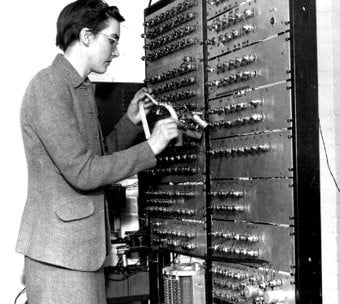

Birth: June 23, 1912
Death: June 7, 1954
Major Academic Events: Alan Turing was born in London, England, on June 23, 1912. Since his family was upper middle class, Turing studied at a top private school. After graduating high school, he went to Cambridge University in 1931. In 1934, Turing received a chance to join a fellowship at King's College. In 1936, he went to Princeton to get his Ph.D. in mathematical logic.
Contributions to Computer Science: Turing is known as the "father of computer science." He created the Universal Turing Machine in 1936. It is a theoretical computing machine that performs computations to solve problems in computer science. The machine is essential because it was the base model for computers. He also created the Turing test, initially called the imitation game, to test if a computer can think like a human mind. Turing also played a crucial role in World War 2 by decoding Germany's encrypted codes, the Enigma. He was able to find multiple weaknesses in the code. From 1939 to 1940, Turing and his group created the Bombe to help supply the Allied forces. Turing also made the first systematic way to break encrypted messages in 1942.
Sources:
https://www.britannica.com/biography/Alan-Turing
https://plato.stanford.edu/entries/turing/
https://www.turing.org.uk/

Birth: June 13, 1937
Death: N/A (still alive)
Major Academic Events: Raj Reddy was born in Katur, India, on June 13th, 1937. In 1958, Reddy received his bachelor's degree from Guindy College Engineering. Two years later, he got his master's degree from the University of New South Wales in Sydney. Reddy moved to the United States in 1964 to get his master's degree and a doctorate in computer science from Stanford. In 1979, Reddy founded the first robotics institute in the United States. He was awarded multiple prestigious awards: the A.M. Turing Award (1994), the French Legion of Honor (1984), the IBM Research Ralph Homory Fellow Award (1991), the U.S. National Science Board Vannevar Bush Award (2006), and many more.
Contributions to Computer Science: Reddy is known for his construction of systems that recognize continuous speech. He invented the Hearsay 1; this system could detect speech recognition. Over 30 years, he and his colleagues have created vocal control of robots, large-vocabulary-connected speech recognition, and unrestricted vocabulary diction. They formed the basis for commercial speech recognition technology. They have also made other minor contributions to AI and computer science areas. He and his team have developed autonomous robotic systems and analysis of scenes. The thing I found most interesting about Raj Reddy is his multiple attempts to decrease the digital divide and bring technology to the underprivileged.
Sources:
https://csd.cmu.edu/news/raj-reddy-receive-honorary-degree-cmu-commencement/
https://www.britannica.com/biography/Raj-Reddy
https://amturing.acm.org/award_winners/reddy_9634208.cfm

Birth: July 9, 1922
Death: September 29, 2022
Major Academic Events: Kathleen graduated successfully, earning a Bachelor's degree in Mathematics and a Ph.D. in Applied Mathematics
from the University of London in 1950. She went on to work as a research assistant at Birkbeck College, which is where she made her
main accomplishments.
Contributions to Computer Science: Kathleen joined forces with her husband in his research, and them and their group were on the path to create the first computer systems at Birkbeck College. Together, their team created the ARC (Automatic Relay Computer), the SEC (Simple Electronic Computer), and the APE(X)C (All-purpose Electronic (Rayon) Computer), which were all huge achievements given the amount of resources they had access to. In 1957, Kathleen founded the School of Computer Science and Information Systems at Birkbeck College and in 1958, she published a book on programming the APE(X).In 1978, they founded their own business, Autonetics Research Associates, where she served as CEO. After a great computer science career, Kathleen decided to retire where she would keep writing books.
Sources:
https://www.theguardian.com/technology/2022/nov/10/kathleen-booth-obituary
https://hackaday.com/2018/08/21/kathleen-booth-assembling-early-computers-while-inventing-assembly/
https://www.telegraph.co.uk/obituaries/2022/10/25/kathleen-booth-computer-pioneer-who-made-major-breakthrough/